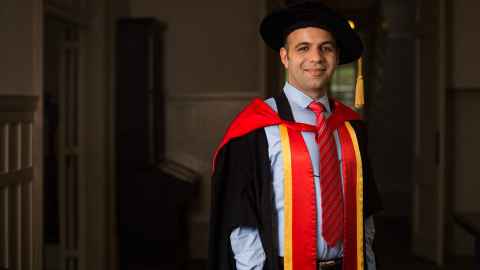Using data in a good way, and making boring breathing exercises fun
27 September 2019
Dr Hamed Minaeizaeim was studying his PhD in Bioengineering at the Auckland Bioengineering Institute (ABI) when, in his spare time, he developed a device to make the chest physiotherapy exercises prescribed for children with lung disorders a fun thing to do.

The device, BreatheHero, was developed in collaboration with a team of researchers at the University and has won several awards, including the UniServices prize in the Velocity $100,000 Challenge 2015 from the University of Auckland.
It is about to be trialled among 20 children with cystic fibrosis at Starship Children’s Hospital (a trial funded by Cure Kids) to see how the children respond to the device, and if it encourages them to do their exercises.
“These chest exercises are the most important treatment for the health of children with lung conditions such as cystic fibrosis,” says Dr Minaeizaeim. “They have to do them to clear their lungs, but the exercises are tedious, repetitive and boring, so they often don’t.”
Using sensors and gaming technology, BreatheHero makes the exercises fun, measures how well the children do them, rewards them when they do them well, and also collects data on how often they do them.
The trial, led by Associate Professor Cass Byrnes from the Faculty of Medical and Health Sciences at the University, will help inform larger studies to determine if the device encourages children to do their chest exercises and if it improves their quality of life.
These chest exercises are the most important treatment for the health of children with lung conditions such as cystic fibrosis ... but the exercises are tedious, repetitive and boring, so they often don’t
Dr Minaeizaeim graduated in September. For his PhD he also focussed on the lung, using mathematical modelling to develop a framework to, using medical imagery, track changes in diseased lungs more precisely than is currently possible.
“Interpreting the results of current scanning technologies depends upon the expertise of the clinician and is very subjective,” says Dr Minaeizaeim. “This was about creating a more quantitative way of assessing the progress of the disease.”
He was supervised by Dr Alys Clark and Professor Merryn Tawhai, both internationally recognised pioneers in lung modelling research.
Dr Minaeizaeim began his studies in mechanical engineering at Bu-Ali Sina University in Iran before winning a scholarship to Stellenbosch University in South Africa, where he completed a Masters in Mechatronics Engineering. He worked as a consultant engineer in South Africa, but decided to follow up on his passion for biomedical engineering and moved to Auckland to study at the ABI.
“It is one of the best multidisciplinary bioengineering institutes in the world,” he says. “It’s a multicultural institute with so many incredibly talented students and researchers who are researching cutting-edge technology and science to reshape the future.”
Dr Minaeizaeim is now employed as a Research Health Intelligence lead at Mahitahi Hauora, the new primary care entity set up in Northland, and which is committed to closing the equity gap between Māori and non-Māori in the region. He is leading a data analytics team to better identify where the gaps are in healthcare, why the healthcare systems are disadvantaging Māori and how to address that.
While a lot of work has been done to address health inequities in Northland, too many Māori are still ending up in hospital. “A lot of work has been done in this area, and many organisations are recording data, but they are not using it in an efficient and effective way,” he says.
“We are looking to use all the data-gathering techniques that are currently available to actually help patients, to use data more effectively and efficiently, to improve healthcare in Northland.”
Media contact
Margo White I Media adviser
DDI 09 923 5504
Mob 021 926 408
Email margo.white@auckland.ac.nz
Want to help us make a difference?
There are many ways you can make a difference and support the Auckland Bioengineering Institute - you can make a donation or bequest, or even subscribe to our newsletter.